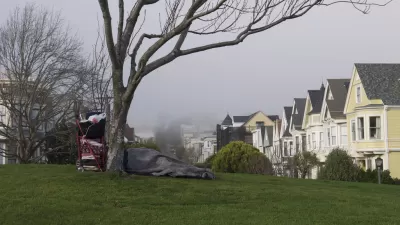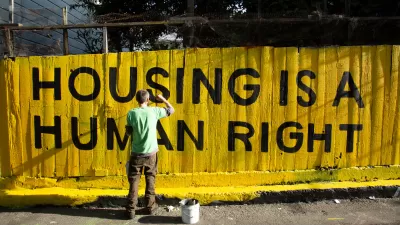Thanks to legislation by Sen. Scott Wiener passed last year, San Francisco will apply a new tool to force treatment on some homeless, mentally ill people who refuse it, but it's limited to five people annually. A new Wiener bill would expand it.

On June 4, the "city’s Board of Supervisors voted 10 to 1 to implement Senate Bill 1045, a bill passed by state lawmakers last year that expands the use of a mechanism known as conservatorship, which gives a court-appointed guardian the authority to make decisions for a person judged 'gravely disabled',” reports Orion Donovan-Smith for The Washington Post. The bill allows for three of the state's 58 counties, San Francisco, San Diego, and Los Angeles, to establish five-year pilot programs based on expanded conservatorship rules.
Conservatorships have been used in California since 1972 to involuntarily treat people grappling with mental illness and alcohol abuse. The new law lets courts “conserve” those who use other substances or have entered psychiatric emergency services at least eight times in a year.
“We see a need to update our conservatorship program in San Francisco because the current one does not contemplate the needs of people with substance abuse disorder,” said Rachael Kagan, communications director for the San Francisco Department of Public Health. “The clinicians who serve these people now are really in need of this tool."
Although the pilot program may affect as few as five people a year, it has pitted elected officials against critics who say the move represents a grave threat to civil liberties.
Why so few people?
The bill, authored by Senators Scott Wiener (D), a former San Francisco supervisor, and Henry Stern (D-Canoga Park, Los Angeles and Ventura counties) and sponsored by then-San Francisco Mayor Mark Farrell, was signed into law last September by Gov. Jerry Brown (D). It was never meant to apply to a large number of people, explains Raquel Maria Dillon, health reporter for KQED, San Francisco's NPR affiliate, on April 25. [Listen and read here.]
“We believe that there are 50 to 100 people on our streets who are so severely mentally ill and drug addicted — can't make decisions for themselves and who are dying — and who could benefit from a conservatorship,” said Wiener.
To qualify, a homeless person has to be held involuntarily in a hospital for psychiatric reasons eight times in the past year.
But when they began to implement the law [by designing the program that would need the approval of the Board of Supervisors], San Francisco officials found that last-minute amendments made it too narrow to apply to many people.
The program was further restricted by amendments added by supervisors to narrow its scope, adds the Post's Donovan-Smith. All but one supervisor voted to support it "after the bill’s sponsors threatened to put it on the ballot if it didn’t pass." But the few people that would benefit from the pilot program annually did not dampen the enthusiasm of the program's supporters.
“This is an important step that will help people [sic] our streets get the treatment they need rather than continuing to cycle in and out of the emergency room, and often the criminal justice system,” said Mayor London Breed in a statement after the board approved the legislation 10 to 1 on June 4.
“Conservatorship will allow us to finally break this cycle by providing sustained care, which is why we are also expanding our treatment beds and other resources to address the issues that these individuals face. Allowing people to continue to suffer on our streets is not acceptable or humane and I am glad the Board of Supervisors supported our approach to finally make a change. I want to thank Supervisor Mandelman for his partnership on this legislation and Senator Wiener for his leadership at the state level.”
New legislation to broaden program
“As drafted, SB 1045 would allow us to help fewer than five individuals,” Mayor Breed told the state Senate Judiciary Committee on April 9, adds KQED's Dillon. "She said lawmakers needed to make changes to broaden the law."
So Wiener wrote new legislation, Senate Bill 40, which would tweak the conservatorship law in a few ways. Most importantly, it would remove the requirement that someone with a drug problem or severe mental illness try advanced outpatient treatment first.
The bill does little to address the concerns of advocates for the homeless and mentally ill, who say it could violate the civil rights of the homeless. They protested outside a town hall on April 6 at UC Hastings School of Law [in San Francisco], then followed Wiener inside and briefly shut down the meeting with booing and singing.
SB 40 was approved by the Senate, 36 to 0, on May 25, and will be heard by the Assembly Judiciary Committee on June 18.
No stranger to criticism
Wiener, by now, has probably grown accustomed to being criticized for his bills, particularly SB 827 and SB 50, arguably the most controversial bills last year and this year, respectively, as they would have weakened local land use authority in order to increase housing on transit corridors and by job centers. Neither bill succeeded.
Sen. Wiener's office had not heard whether the two other counties affected by SB 1045, Los Angeles and San Diego, have initiated their implementing process, according to an email dated June 10.
Recent Washington Post coverage of San Francisco
San Francisco columnist Carl Nolte wrote in his Sunday Native Son column, "Sooner or later, every San Franciscan is going to have to answer this question: Why is the best city in the world such a mess? The Washington Post is the latest to be on San Francisco’s case."
He was probably referring to Karen Heller's column on May 21: "How San Francisco broke America's heart: Filthy rich and dominated by a tech monoculture, it’s gone from America’s great romantic city to 'a train wreck.'"
FULL STORY: San Francisco plans to force mentally ill addicts into a system critics call ripe for abuses

Alabama: Trump Terminates Settlements for Black Communities Harmed By Raw Sewage
Trump deemed the landmark civil rights agreement “illegal DEI and environmental justice policy.”

Planetizen Federal Action Tracker
A weekly monitor of how Trump’s orders and actions are impacting planners and planning in America.

The 120 Year Old Tiny Home Villages That Sheltered San Francisco’s Earthquake Refugees
More than a century ago, San Francisco mobilized to house thousands of residents displaced by the 1906 earthquake. Could their strategy offer a model for the present?

In Both Crashes and Crime, Public Transportation is Far Safer than Driving
Contrary to popular assumptions, public transportation has far lower crash and crime rates than automobile travel. For safer communities, improve and encourage transit travel.

Report: Zoning Reforms Should Complement Nashville’s Ambitious Transit Plan
Without reform, restrictive zoning codes will limit the impact of the city’s planned transit expansion and could exclude some of the residents who depend on transit the most.

Judge Orders Release of Frozen IRA, IIJA Funding
The decision is a victory for environmental groups who charged that freezing funds for critical infrastructure and disaster response programs caused “real and irreparable harm” to communities.
Urban Design for Planners 1: Software Tools
This six-course series explores essential urban design concepts using open source software and equips planners with the tools they need to participate fully in the urban design process.
Planning for Universal Design
Learn the tools for implementing Universal Design in planning regulations.
Clanton & Associates, Inc.
Jessamine County Fiscal Court
Institute for Housing and Urban Development Studies (IHS)
City of Grandview
Harvard GSD Executive Education
Toledo-Lucas County Plan Commissions
Salt Lake City
NYU Wagner Graduate School of Public Service





























